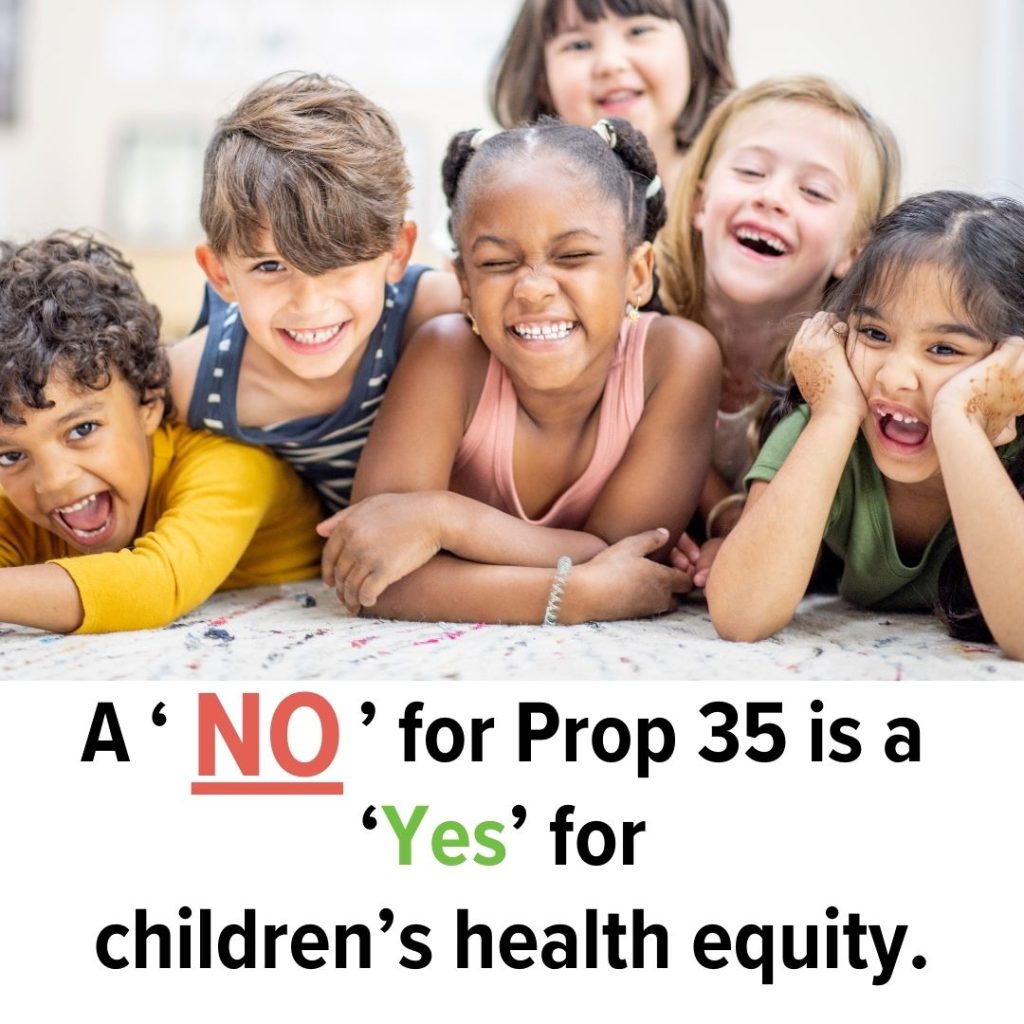Vote ‘No’ on Prop 35 this November

The Children’s Partnership is grateful that the 2024-25 state budget included funding to implement the multi-year continuous Medi-Cal coverage protection for children from birth to age 5.
Unfortunately, this policy – and many other programs and initiatives that support people on Medi-Cal, including a living wage rate increase for community health workers – would be rendered “inoperative” if Proposition 35 passes this November.
Prop 35 directs revenue raised from the Managed Care Organization tax to fund rate increases for a limited number of Medi-Cal providers, forever limiting the Legislature’s ability to use any of those funds for other budget needs – even if those needs include other Medi-Cal supports.
TCP strongly supports the MCO tax and increasing provider rates. As an organization committed to strengthening California’s health care system as an essential part of advancing child health equity, TCP has historically worked alongside many of the proponents of Prop 35, and supported and advocated for the MCO tax as a funding mechanism, as well as for directing that funding to Medi-Cal provider rate increases.
There is no question that California pays far too little to providers participating in Medi-Cal, hindering health care access for the millions of Californians who rely on it, and disproportionately impacting children and families of color who are more likely to depend on Medi-Cal for coverage.
However, TCP opposes Prop 35 because of its restriction on how the MCO tax revenue funds can be used, the caps on the tax, and who the decision makers are in making those determinations.
- Prop 35 Redirects Billions of Medi-Cal Dollars, Threatening Future Benefits and Expansions: Prop 35 permanently diverts billions of dollars that currently support Medi-Cal and the state’s general fund to just a handful of specific provider rate increases. Doing so threatens future Medi-Cal program eligibility expansions and optional benefits. The state’s Department of Finance says Prop 35 would cost the state general fund $12 billion over the next three years to cover core Medi-Cal expenses. As we anticipate difficult budget years ahead, this hit to the general fund likely will be painful.
- Prop 35 Sets Up California to Face a Significant Decrease in Revenue in Future Years By Prioritizing the Interests of Private Insurers: Prop 35’s tax cap will lead to a significant decrease in revenue from the MCO tax, further undermining the state’s ability to support efforts to improve children’s health. Prop 35 establishes an upper limit on the tax rate for commercial health plans, instead relying on revenue from Medi-Cal plans, risking a dramatic reduction in revenue. The current tax rate for Medi-Cal plans is $274 per enrollee, to maximize matching federal dollars. Prop 35 would cap the tax rate on commercial plans at $2.75 per enrollee. The problem with this is the federal government has indicated that it intends to change the rules so that states would be required to set similar tax rates for both Medi-Cal and commercial plans. When this happens as expected, Prop 35’s commercial tax cap will leave California no choice but to dramatically lower its Medi-Cal tax rate by nearly 100x.
- Prop 35 Funding Allocations Don’t Align with Community Needs: The allocation of funding under Prop 35 is decided by a few provider organizations with little voice from Medi-Cal enrollees, community members, Legislature, or other essential provider groups, such as community health workers.
While intended to increase Medi-Cal access, Prop 35 instead severely jeopardizes funding for Medi-Cal by restricting state funding sources for the program.
This is especially apparent in the programs and investments on the line this year. In addition to continuous Medi-Cal coverage for young children and a rate increase for community health workers, many other Medi-Cal health care providers would lose out on funding if Prop 35 passes. This includes pediatric day health centers and community-based adult health services, which serve a wide variety of people, such as older adults living with Alzheimer’s and other chronic conditions, and people with disabilities. (See this CalMatters article for a list.)
Again, TCP strongly supports the MCO tax and investments in provider rates. However, for the reasons outlined above, The Children’s Partnership opposes Prop 35, and we urge supporters of children’s health equity to vote no in November.
